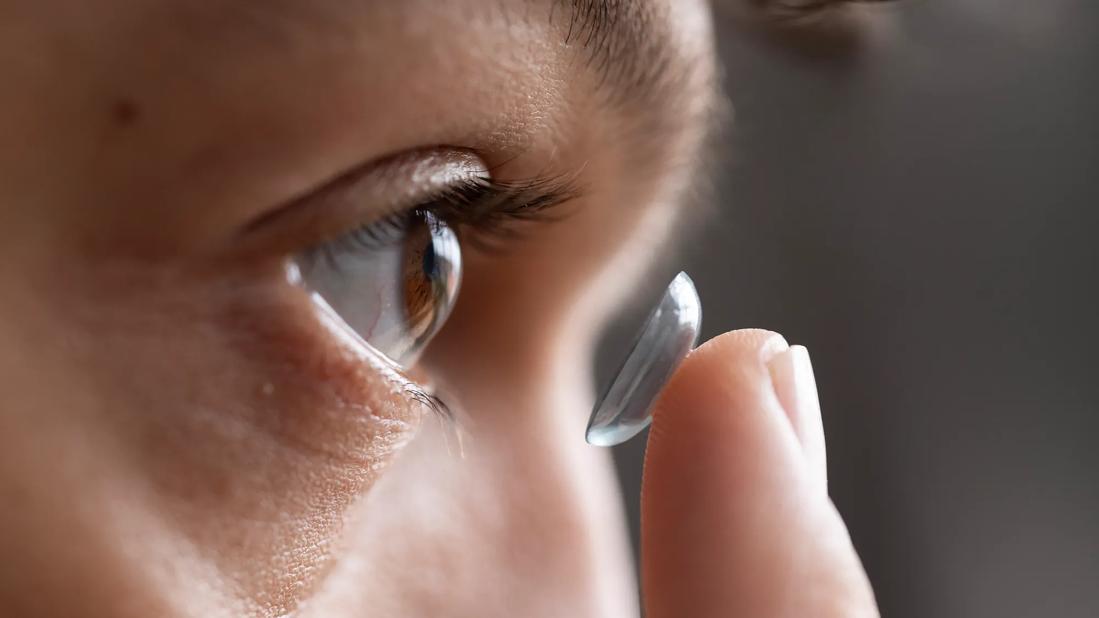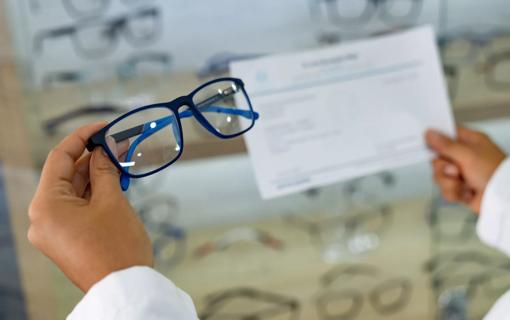Keep your eyes healthy by not sleeping in your contacts, properly caring for your lenses and wearing eye protection when necessary

No one wants an eye infection from contacts. And if you’ve ever slept in your contact lenses, worn disposable lenses past the prescribed replacement schedule or gone for a dip in the community pool without removing contacts from your eyes first, it’s time to rethink those unhealthy habits.
Advertisement
Cleveland Clinic is a non-profit academic medical center. Advertising on our site helps support our mission. We do not endorse non-Cleveland Clinic products or services. Policy
Why? Because poor choices can lead to serious infections in some cases, says optometrist Reecha Kampani, OD.
The good news? You can usually avoid these health problems by knowing what to watch for and by practicing good habits.
Dr. Kampani shares how proper care can help prevent a contact lens infection and why you shouldn’t wear your contacts all the time.
Yes, you can.
That’s why it’s important to take your contacts out each day and give your eyes a break. You also shouldn’t wear your contact lenses beyond their intended period of time (daily, monthly, etc.).
“When you’re wearing contact lenses, you’re getting less oxygen to the eye than normal. So, if you’re then overwearing that contact you’re putting the eye under more stress than it would be otherwise,” explains Dr. Kampani. “And that’s compounded by the fact that a soft lens contact is porous and can be the perfect breeding ground for bacteria.”
This can cause eye infections like:
An eye infection can lead to a higher risk of microbial keratitis, or a corneal infection or even a corneal ulcer.
It’s important to make sure you follow proper care and cleaning when it comes to contact lenses. Dr. Kampani shares the following tips on how to avoid an eye infection if you wear contacts.
Advertisement
Whenever Dr. Kampani fits patients for contact lenses, she shares the rule of the three “Ss”: Don’t sleep, swim or shower in your lenses.
The second two “Ss” apply to water. Water may contain pathogens or pollutants that cause the infections listed, so be careful not to get any in your eye, especially while wearing contacts.
Swimming presents specific problems. Pools, lakes and even hot tubs may harbor bacteria and microbes that can produce a serious infection, such as acanthamoeba keratitis, which free-swimming amoeba cause. This type of infection can cause visual impairment or even blindness.
First, don’t wear lenses beyond their recommended replacement schedule. Secondly, don’t sleep in lenses.
“One of the biggest problems with overwearing or sleeping in the lenses is you’re getting less oxygen to the eye,” Dr. Kampani says. “This can lead to infection, inflammation and abrasions to the eye because the added oxidative stress makes the eye more vulnerable to various bacteria and pathogens.”
If you wear soft contact lenses, pay special attention. These lenses create the ideal condition for pathogens to grow, like a petri dish. Daily disposable soft lenses have helped reduce the risk of complications, but healthy habits are still extremely important.
Some people tend to reuse their contact lens cleaning and storage solution. Or they “top it off” instead of adding fresh solution to their lens cases every day. The minor savings you get from this aren’t worth a potential infection.
Throw out your solution and start fresh daily. And be sure to replace lens cases once every three months, too, Dr. Kampani says. Using a case for too long can add to pathogen buildup.
“Make sure you’re washing your hands before you touch your eyes,” she stresses. “And avoid touching or rubbing your eyes when you have contacts in.”
Storing contact lenses in a hydrogen peroxide-based solution is an efficient way to reduce bacteria. These solutions, available in stores, are especially effective at cleaning lenses, Dr. Kampani notes.
Various brands may have different directions for soaking the lenses, so be sure to check labels. Usually, the recommendation is to store the lenses in the solution for at least four to six hours. It’s safe enough to use every day. Make sure you don’t put the solution directly into the eye or rinse the lenses without the proper supplied case.
Unfortunately, contact lenses and eye infections are common. If you have an eye infection you may experience:
Advertisement
You should stop wearing your contacts immediately and contact your eye doctor if you have any symptoms. Your vision is too important to risk long-term damage from an infection. An eye infection won’t go away on its own — and some contact lens-relation eye infections may cause vision loss and have other serious complications.
Advertisement
Learn more about our editorial process.
Advertisement

A correct prescription helps your eyes see clearly — but as natural changes occur, you may need stronger or different eyeglasses

It usually takes anywhere from a couple of days to a few weeks to get fully adjusted

The lifespan of contact lenses depends on whether you have reusable or disposable lenses

While rare, it is possible to have an allergic reaction to materials used in contact lenses or ingredients found in contact solution

While it may seem harmless, showering — or even swimming or washing your face — with contacts in can cause sensitivity to light, irritation and even an infection

Even napping with contacts in can lead to eye infections, lens displacement and dry eyes

Both have pros and cons, but ultimately it’s a personal decision only you can make

Your eye prescription reveals a lot about your eye health, including how they’re shaped, how well you see and what your new glasses can do for your sight

Wearing a scarf, adjusting your outdoor activities and following your asthma treatment plan can help limit breathing problems

Your diet in the weeks, days and hours ahead of your race can power you to the finish line

When someone guilt trips you, they’re using emotionally manipulative behavior to try to get you to act a certain way